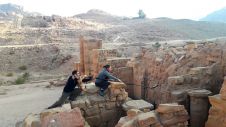Secure Tenure
The Expert Group Meeting on Secure Tenure: ‘New legal frameworks and tools’, was held at the UN Conference Centre in Bangkok from 8th to 9th December 2005. More than fifty experts from over twenty countries were invited to join the meeting; 22 papers on the subject were presented and discussed. FIG Commission 7 Cadastre and Land Management, the World Bank, UN Habitat and the UN Economic and Social Commission for Asia and the Pacific were responsible for convening the meeting. The Austrian Development Agency, the Vienna Institute for Development and Co-operation, The Net-herlands Cadastre Land Registry and Mapping Agency, the International Institute for Geo-Information Science and Earth Observation ITC and the United Nations University leant support. The aims of the meeting were:
- to discuss new legal frameworks for the improvement of land tenure security and access to land related benefits
- to discuss new ideas about tools that might support the implementation of these new legal frameworks
- to identify pro-poor land administration approaches for both urban and rural areas
- to discuss evolutionary approaches for recording and mapping of land tenure forms
- to discuss possibilities for improving existing land administration systems
- to learn from other countries facing the same challenges
- to summarise experience and ideas in the form of a booklet for wide distribution
- to develop a research agenda for a network of research institutes within the region
- to encourage decision-makers to pay adequate attention to implementation aspects of land policy.
Spirit and Innovation
The recent World Bank Research Report on Land Policies for Growth and Poverty Reduction states: "Land policies are of fundamental importance to sustainable growth, good govern-ance, and the well-being of and the economic opportunities open to rural and urban dwellers-particularly poor people". In its Handbook on Best Practices, Security of Tenure and Access to Land and the guide Pro-Poor Land Management UN/Habitat, in line with the World Bank report, encourages innovative approaches to land management and land administration in the implementation of land policies. This is necessary as part of a process of recognising "that people living in slums have a right to be in the city, and that this recognition will begin to make slum dwellers legitimate citizens, which will start to legalise their tenure". In many countries in Asia new land laws have recently been put on the statute book, and others are under discussion. What kind of tools do we need to adequately support the spirit and letter of these new legal frameworks, and what innovative ideas are there concerning information systems and work processes? How can we improve existing land administration systems?
Special Population
The chair of Commission 7, Prof. Paul van der Molen, observed that benefits of land reforms could only be achieved within the context of a broader development policy. Conventional approaches have been proved not to work well; only innovative institutional arrangements can cope with increasing populations, greater investments in land, economic growth, and more social welfare. Lack of such provision leads to land grabbing, conflict and misuse of resources, as well as undermining productive and economic potential. What to do? The exclusive focus on formal titling has proven to be inappropriate. There must be much greater attention paid to existing institutional arrangements, to stronger rights for women, herders, and indigenous peoples. Uncritical emphasis on land-sales markets should be avoided; rental markets provide more equity, productivity and long-term investment, if restrictions are eliminated. Land reform can only be fully utilised if requirements and scope of intervention is carefully compared with others and the 'land issue' is seen as part of a broader development policy. The impact of all of this is that innovative definition of property rights, simple procedures, quick and low-cost transaction mechanisms, and simple, low-cost, efficient, effective, transparent and participatory systems have to be developed. Such systems have to be free from political pressure. Low-cost demarcation is important here; what is needed are available mechanisms for conflict resolution and inclusion of Land Administrations as a basis for Spatial Data Infrastructures at low cost, transparent and accessible for linking registers of different categories and at different levels.
World Urban Forum
Many new approaches were discussed by the meeting, examples of which include:
- community-driven adjudication (Aceh)
- protection of rights for vulnerable groups (Aceh)
- non-judicial land disputes (Cambodia)
- gender mainstreaming(Phi- lippines)
- simple procedures (Vietnam)
- land sharing (Cambodia)
- stewardship and guardianship (Fiji)
- Bhoomi approach, with kiosks and self help (India)
- protection of traditional lifestyle in relation to land (Mongolia)
- 'sticker on orthophoto' approach (East Timor).
Customary tenure is an issue. In his concluding remarks the chairman said that the proceedings of the meeting should be published and that further analyses were required. Results of such analyses would have to be presented at the World Urban Forum to be held in Vancouver, Canada in June 2006.

Value staying current with geomatics?
Stay on the map with our expertly curated newsletters.
We provide educational insights, industry updates, and inspiring stories to help you learn, grow, and reach your full potential in your field. Don't miss out - subscribe today and ensure you're always informed, educated, and inspired.
Choose your newsletter(s)
























